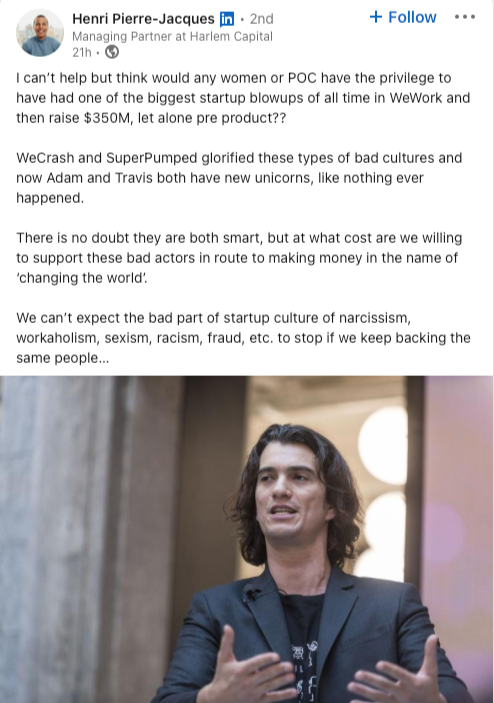17 August 2022 | FinTech
A16z’s Latest Investment Exposes VC
By
“Venture capital firms continue to gamble on poor investments… while on the other hand, women and founders of color with well-thought-out, substantive business plans remain in the waiting room.”
Rep. Stephen Lynch (D-MA) during a June hearing on Combatting Tech Bro Culture

Andreessen Horowitz has 42 fintech companies in its portfolio, according to the fintech section of its website. While there are more companies in its entire portfolio, of the 42 listed:
Only 4 women are co-founders:
- Lucy Hoffman, Co-Founder & COO, Carry1st
- Maricarmen Herrerías, Co-Founder & COO, Casai
- Shuo Wang, Co-Founder, Deel
- Gina Gotthilf, Co-Founder & COO, Latitud
(a16z has not responded to requests for comment).
Now, nearly three years after Adam Neumann stepped down as CEO of WeWork, a16z said Monday it cut its largest individual check ever, at $350 million, to Flow, Neumann’s new residential real estate company focused on rentals.
And yes, to make matters worse, the company’s name is Flow.

I never watched the TV show WeCrashed (and I love Princess Mia as much as everyone else), but I know how it ends.
WeWork’s dramatic rise and spectacular failed first attempt at going public was the collateral damage after good ideas were limited by old thinking, toxic startup culture, and outdated management theory.
And while a16z is cutting checks for a founder that has demonstrated toxic behavior, women and BIPOC founders are sitting in the backseat.
In fintech, $35 billion in investments poured in last year. Yet (and I will report these numbers until things change):
- 2% of that money flows to female founders
- 1.8% to Latinx founders
- 1% to Black founders
A sigh of exhaustion is typically the first response when I ask any female founder I interview about the raising process.
Of course, it’s hard for anyone to raise money (except Adam Neumann, apparently).
But imagine being a founder that has done everything right and seeing someone like the former WeWork CEO get another chance.
It isn’t very encouraging.

Sure, there aren’t many women writing venture checks. For example, female VCs hold just 15.4% of general partner positions in the U.S.
Even prominent investor Katie Huan departed a16z earlier this year to build her own $1 billion crypto investment firm.
But should the responsibility of gender equity in VC solely rest on the shoulders of women?
Hell no.
In June, a congressional hearing was needed to address the persistent inequities in funding for female- and minority-founded startups.
The root of the problem: Most partners at VC firms are white men, and research shows investors are 21% more likely to back founders that look like them.
But VC funds benchmark based on what they already know.
And so, when you bring in diverse founders approaching problem-solving from an entirely different direction, it doesn’t resonate with them.
Diverse founders have disproportionately felt the current economic downturn in quarter one of this year.
VC funding dropped 26%, but investment in female-founded companies fell by 34%.
Former Wall Street executive Sallie Krawcheck, who founded Ellevest, was among those who presented testimony at the hearing.
In Sallie’s experience, raising early-stage capital from women investors sometimes makes it harder for women to get the next round of funding. (Ellevest investors include Melinda French Gates’Gates’ Pivotal Ventures and individuals like Elaine Wynn).
Pure biases come into play.
For example, according to Sallie, there is an assumption that you weren’t good enough to get funding from the guys, so investors question whether to invest at later stages.
Fintech companies that aim to reach consumers underserved by traditional financial institutions, including women and people of color, are not set up for success when the lack of VC available to diverse-founded fintechs is so severe.
It’s troubling as it hinders innovation that would inherently benefit underserved consumers.
Despite the disparities, some VCs are working to bring more opportunities to female founders.
Mendoza Ventures proves that intentional inclusion at a firm’s core is 1. Possible and 2. Profitable.
Amy Nauiokas, the co-founder and co-CIO of Anthemis, has dedicated its firm to investing in diverse founders – especially women and women of color. (Learn more about that here).
TL;DR:
- Civil rights protections are vital to the fabric of our society.
- Industry leaders should extend those civil rights protections to consider an investment decision.
- Then extend those protections to the hiring processes. If that happened, there would be a diverse practice and investment portfolio.
And if anyone ever tries to tell you that there are no female founders building fintech startups. Show them this.
And now, time for a laugh.

(Editor’s note: I based this on the 42 companies a16z listed on the fintech section of its website. There could be more fintech co’s in their portfolio they haven’t listed here, but from this sample size, the ratio isn’t good).